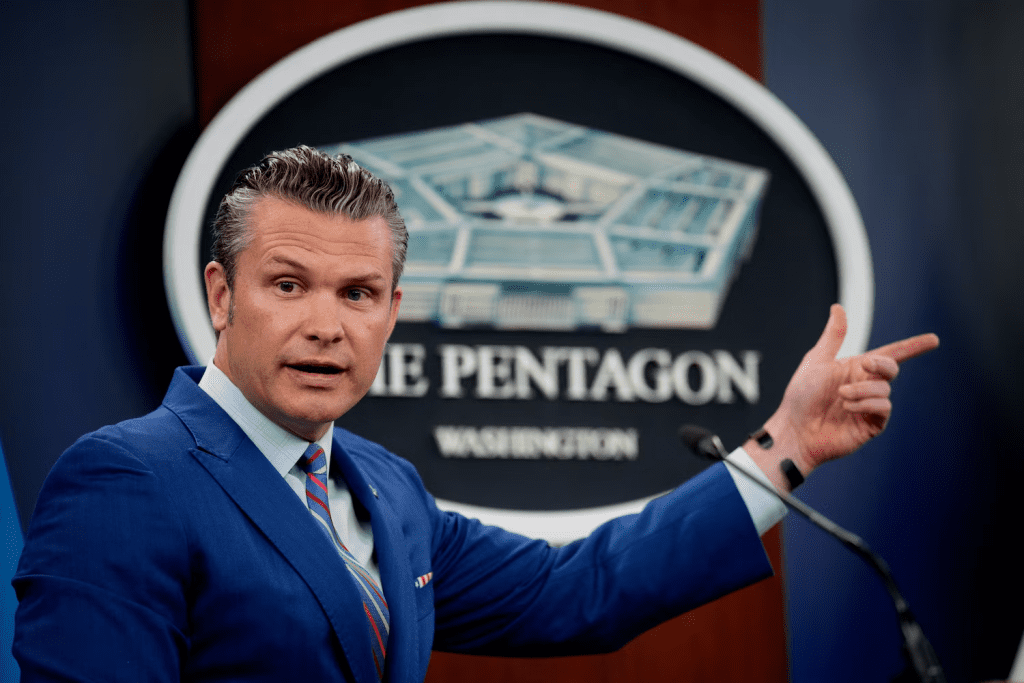Massive Fallout at the Pentagon as Defense Secretary Pete Hegseth Revokes Press Badges from Nearly All Major Media Outlets After Refusal to Sign New Security Agreement
In an unprecedented move that has rocked Washington’s press corps, the Pentagon on October 15, 2025, revoked access badges from nearly every major U.S. media organization after reporters refused to comply with new security regulations introduced by Defense Secretary Pete Hegseth. The decision, confirmed by the Pentagon Press Association and reported by major outlets including AP and NPR, has left journalists barred from one of the government’s most closely watched institutions.

The dispute erupted over Hegseth’s newly implemented media access policy, a set of rules designed to curb leaks of sensitive military information and reinforce internal discipline following a string of classified material breaches earlier this year. The guidelines required all reporters covering the Pentagon to sign a non-disclosure agreement that explicitly prohibited publishing details that could be deemed “harmful to national security,” with violations subject to potential criminal prosecution.
While the Defense Department framed the policy as a necessary safeguard in an era of information warfare and foreign cyber espionage, media organizations viewed it as a direct assault on press freedom. Reporters from outlets including CNN, Reuters, The Washington Post, and The Associated Press refused to sign the new agreement, citing concerns that the language could criminalize legitimate journalism and compromise the First Amendment. As the standoff deepened, Pentagon officials began revoking credentials, effectively emptying the press room by mid-afternoon.

“The Defense Department confiscated the badges of reporters from virtually every major media organization in America because they refused to sign onto the new media policy,” the Pentagon Press Association said in a public statement. “This policy presents an implicit threat of criminalizing national security reporting and exposes those who sign it to potential prosecution.”
Hegseth, a decorated Army veteran and longtime advocate for military reform, defended the decision in a brief press appearance outside the Pentagon, arguing that the measure was about responsibility, not censorship. “For too long, leaks have endangered American troops and compromised missions,” he said. “We’re not silencing anyone—we’re asking for accountability. National security isn’t a political game.”

The Trump administration stood firmly behind Hegseth, emphasizing that the policy aimed to protect intelligence integrity in an age where sensitive documents often reach adversaries within hours of disclosure. Supporters within the administration pointed to past scandals, including unauthorized leaks of defense briefings and classified operations, as justification for tightening restrictions.
Critics, however, see the move as a defining test of press freedom under Trump’s leadership. The American Civil Liberties Union and Reporters Committee for Freedom of the Press both condemned the revocations as “an alarming escalation in the government’s hostility toward transparency.” Yet among Trump supporters and conservative commentators, the sentiment was markedly different—many praised Hegseth for standing firm against what they see as an irresponsible media culture more focused on political sensationalism than national defense.
By evening, photos circulated across social media showing reporters collecting their belongings from Pentagon hallways, escorted by security personnel. Some correspondents expressed disbelief at how swiftly access was terminated, describing the scene as “surreal” and “historic.” Others warned the decision would have a chilling effect on government accountability.

Despite the backlash, officials close to Hegseth signaled that the policy will not be rolled back. The Defense Secretary reportedly plans to meet with select media representatives next week to discuss possible revisions to the agreement, but insiders expect little compromise. “This administration is not retreating from protecting classified information,” one senior defense aide said. “Leaks endanger lives. Secretary Hegseth’s policy ensures that doesn’t happen again.”
The mass revocation marks one of the most significant confrontations between the Pentagon and the press in modern history. Whether it becomes a new norm or sparks a legal showdown over press rights remains to be seen, but one thing is clear: under Pete Hegseth’s watch, the Defense Department is drawing a hard line between security and disclosure—and standing by it, no matter the political fallout.


